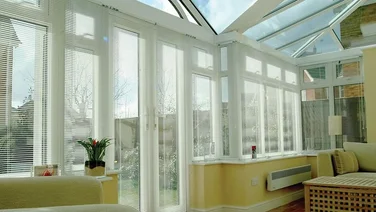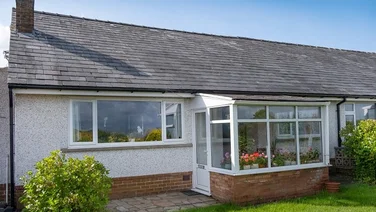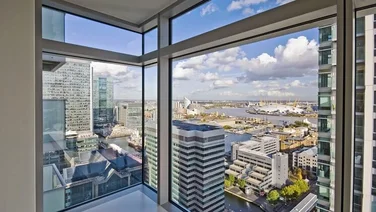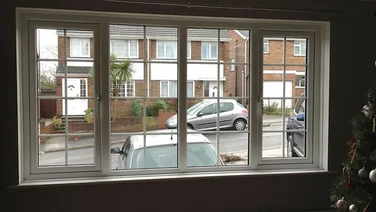- Wooden double-glazed windows can last up to 60 years
- There are two types of wood to choose from: hardwood and softwood
- Fill in the form above to get free home security quotes
Wooden double glazed windows cost more than uPVC ones, but that doesn’t stop them being a popular choice for many homeowners.
They’re traditional and elegant and will help warm your home and reduce noise.
But how many types of wooden double-glazed doors are there? How much will they end up costing you? And which companies sell them? Read on to find out everything you need to know before investing in wooden double-glazed windows.
Alternatively, you can skip the reading and head straight to our details form. Once you’ve filled out your details, our professional installers will be in touch shortly to offer free quotes and help get the ball rolling.

Types of wooden windows
If wooden double-glazed windows are your ideal choice for your home, then make sure you’re aware of the different types you can buy. If you’re not clued up, it can get overwhelming pretty quickly.
Wooden double-glazed windows have three styles: sash, casement and bay. Not all window companies will offer bay windows, but sash and casement windows are pretty common.
Let’s take a more in-depth look at these three main options, but before that our guide on double glazing costs has more general information on what you might expect to spend.
What are sash windows?
Sash windows have one or more movable frames, which open by sliding via a mechanism attached to the frame.
Many people couple wood with a sash style window for their home. After all, wood and sash window frames have something in common: they’re both excellent for maintaining a traditional aesthetic charm.
What are casement windows?
These windows are attached to their frame by one or more hinges at the side. Casement windows are often held open in position using a metal bar with hooks, known as a casement stay.
This type of window gives your home a more contemporary look, while the wood feature will simultaneously maintain the traditional aura – it’s the best of both worlds!
What type of double glazing do you need?
Get startedWhat is a bay window?
Bay windows project outward from the main walls of a home. Three or more windows usually project at 45° or 90° angles, to form a box bay window. This type of window works particularly well for smaller properties.
If you manage to find a local company that will install bay windows, it can add an extra bit of space to your home. Using wood for this style of window will also add a traditional touch to it.
Choose between softwood and hardwood
The best place to start is to distinguish what category of wood you’d like, as this will help your final decision. Each type of wood is split into two categories – softwood and hardwood – and each one has its own set of benefits to flaunt.
Softwood is quite versatile and is available in a painted finish only, but it is much cheaper than hardwood. It’s also easier to work with various styles, but the most popular choice is douglas fir.
Hardwood, however, is naturally strong, is durable and is high density. It is also more weather resistant, and is available in both painted and stained finish. The most popular hardwood choice is oak.
Both options have enticing aspects, and could provide the finishing touch to your home. According to the World Wildlife Fund (WWF), despite being the cheaper option, 79% of timber windows sold in the UK are softwood frames.
So don’t let the lower price deceive you. Something labeled as ‘cheaper’ can create the illusion of flimsy material that will break at the slightest gust of wind. Both options are brilliant, but if you’re on a budget, softwood it the option for you.
Cost of wooden double-glazed windows
Generally, wooden windows are a nice middle-ground. They are more expensive than uPVC frames, but less expensive than aluminium. The cost of each frame will vary depending on size, but what sort of price ranges can you anticipate?
Below, we’ve created a table to show the average prices you can expect to pay for different sizes of windows. Since sash and casement windows are the most popular styles of window (and most companies only offer a choice between them), these are the two we’ve chosen to compare.
| Types of window | Measurement | Price |
|---|---|---|
| Casement | 625mm x 1045mm | £500 |
| Casement | 90mm x 1045mm | £570 |
| Casement | 1195mm x 1045mm | £750 |
| Sash | 630mm x 1045mm | £660 |
| Sash | 855mm x 1045mm | £766 |
| Sash | 1080mm x 1045mm | £828 |
As you can see, sash windows are more expensive than casement in each size. But remember – these are just averages of what you can expect. There will be lots of other factors to take into account when looking overall costs, such as:
- Installation costs – Installation costs are added on top of the price of the window. We can’t give an exact price for this, as most installation prices will vary depending on your location, the size of the window, and whether there is any existing structural damage.
- Choice of wood – As mentioned above, hardwood is more expensive than softwood
- Measurements – The bigger the window, the bigger the cost
- Whether the windows are installed upstairs or downstairs – Second-floor installations require additional equipment, such as scaffolding, ladders, and safety harnesses. Setting up this equipment will also extend the duration of the project.
Wooden window companies
If you’ve already started your research, you will no doubt have come across the UK’s many window suppliers. However, not all of these supply wooden windows.
Below, we’ve listed the four main national window installers in the UK. You can check out which companies supply wooden windows below:
| Installer | Wooden windows | uPVC windows | Aluminium windows |
|---|---|---|---|
| Anglian Home Improvements | Yes | Yes | Yes |
| Everest | Yes | Yes | Yes |
| Safestyle UK | No | Yes | No |
| Zenith Home Improvements | No | Yes | No |
Anglian and Everest are both excellent installers to go with. That said, for us, Anglian is just one step ahead in this war of the windows. Why? Well, they install wooden frames for casement, sash, cottage, bay, and flush windows. Everest, on the other hand, can only do casement and sash, similar to many other installers.
Wooden vs other types of windows
Wooden windows cost more than uPVC (the UK’s most popular choice of window material). But what they lack in sheer affordability, they gain in demonstrable quality.
There are a number of benefits to choosing wood over plastic – particularly wood’s eco-friendliness. If dealt with appropriately, wooden window frames can be totally renewable, meaning they can be recycled or reused properly if they need replacing. And yes, uPVC is cheaper, but it consists of 43% non-renewable materials.
Plus, if you live in an old building, opting for wooden double glazing will keep the aesthetic intact. Even better if you opt for a style that matches the building’s era, such as Georgian windows.
But what other advantages do wooden windows offer? Check them out below:
- More eco-friendly
- Lasts longer than uPVC
- Increases property value
- More insulating
- More aesthetically pleasing
- Requires more maintenance
- More expensive than uPVC
Want to see really how much these types of materials differ in price? Check out our window cost calculator below. You can input the style and material you’d like, and it does all the hard work for you.
How long do wooden windows last?
Wooden windows have an estimated lifespan of 60 years. But that’s as long as you keep your windows safe from mould or rot.
By contrast, uPVC has an estimated lifespan of just 30 years, so it’s worth figuring out whether you can afford to fork out a few more pennies now to save more in the long run.
Find out more about how long windows last and the factors that can affect this by going to our page.
Guarantees for wooden windows
One of the main downsides to wooden windows is the maintenance involved. Luckily for you, we have a solution: guarantees.
When you purchase your timber windows, the double glazing manufacturers will provide guarantees, which can help you maintain your windows. Before buying, always check with the supplier which guarantees are included within your quote, and how long they last.
Here are the most common and useful guarantees offered by leading wooden double glazing manufacturers:
| Guarantee | Description | Typical length offered |
|---|---|---|
| Insect and fungal infection | The manufacturer applies a coat of anti-fungus and rot prevention treatment to finish your windows | 10-30 years |
| Sealed units | Most double glazing manufacturers offer a guarantee on sealed panels. If you spot any issues with your panes that are caused because the seal has dried out within this time, they should repair or replace the sealed units for you. | 10 years |
| Hardware | Hardware guarantees apply to the fixtures that come with your windows, e.g. frames, handles, sashes, hinges | 10 years |
| Workmanship | This guarantee is similar to a typical manufacturer’s warranty. The company who are fitting your window may also offer a guarantee to ensure they carry out a quality job when fitting your windows. | 5-10 years |
| Paint finishes | Most wooden double glazed windows come with a paint finish. The guarantee means no additional painting should be required for the length of the guarantee period. | 5-8 years |
| Wood stain finishes | Wood-framed windows should also be treated with a protective wood stain finish. This guarantees that you will not need to stain or treat the window frame for the guarantee period. | 5 years |
Summary
- Since 2014, while the number of installers fitting uPVC windows and doors has remained largely unchanged, there has been a 25% increase in timber installations
- One of the main downsides to wooden windows is the maintenance involved
- Wooden windows have an estimated lifespan of 60 years
- If you think wooden windows could be the next big addition to your home, make sure to shop around for the right installer
- You can get more guidance, as well as free quotes, from our local installers. All you have to do is fill in our details form, and they’ll be in contact shortly





